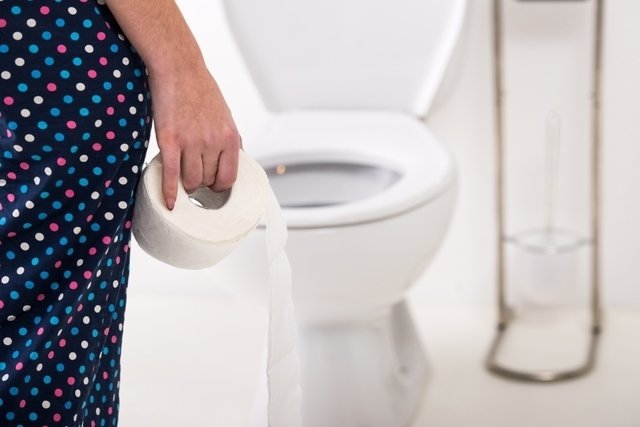Hemorrhoids during pregnancy can appear as a result of increased body weight, pressure placed on the pelvic region or constipation. They are most commonly noted during and after the second trimester of pregnancy.
Hemorrhoids during pregnancy can be treated with increasing fiber intake and sitz baths, however in some cases, the OB may prescribe an ointment or laxatives.
Normally, they resolve with treatment but sometimes they are more difficult to cure and can remain until delivery. External hemorrhoids during pregnancy do not prevent normal labor and do not justify a cesarean section.

Common causes
Having hemorrhoids during pregnancy is normal. They tend to appear due to an increase in body weight, pressure within the pelvis, constipation and blood volume. This increased blood volume circulating through the pregnant woman's body can cause the veins in the anal region to dilate and become swollen, causing hemorrhoids.
Hemorrhoids during pregnancy can appear during any trimester of pregnancy, but they are more common from the second trimester and onwards. However, they tend to disappear about 3 months postpartum.
Main symptoms
Pregnancy hemorrhoids can be internal or external, and can cause symptoms like:
- Pain in the anal region, especially with bowel movements, walking or sitting
- Anal itching
- Presence of bright red blood around the stool or on toilet paper after cleaning
- A lump in the anus, in the case of external hemorrhoids
If a woman experiences any of these symptoms, she should consult her OB for assessment and treatment as necessary.
Treatment options
Hemorrhoids most often occur due to constipation. It is important to treat this situation, in addition to taking measures to relieve hemorrhoid-related pain.
Treatment for hemorrhoids during pregnancy should be directed by the obstetrician, who may recommend the use of analgesic medications, such as acetaminophen, laxatives and ointments with analgesic and anti-inflammatory properties.
In some cases, the doctor may also recommend of a suppository that is inserted in the anus to help with easier bowel movements.
Surgery for hemorrhoids during pregnancy should only be performed if all treatment alternatives are insufficient, if the situation is unbearable for the woman and if the baby is not at risk.
Read more about how to get rid of hemorrhoids with ointments and home remedies.
Home remedies
Home remedies for hemorrhoids during pregnancy can involve sitz baths with warm water to relieve hemorrhoid symptoms like pain sitting, discomfort with a bowel movement, anal itching and anal lumps.
To perform a sitz bath, simply put some warm water in a basin, approximately 37 ºC (or 98.6ºF), and then sit for about 20 minutes, being sure that the hemorrhoid is submerged in water.
Also recommended: Sitz Baths for Hemorrhoids: 4 Ways to Prepare tuasaude.com/en/sitz-bath-for-hemorrhoidsOther precautions
When treating hemorrhoids during pregnancy, women should take certain precautions, such as:
- Avoid using toilet paper, and opt for moistened tissues to clean or warm water and neutral soap after urinating or defecating
- Do not sit or stand for prolonged periods especially on the toilet
- Drink around 2 liters of water per day
- Eat high-fiber foods, such as vegetables, fruits, cereals, beans, chickpeas or whole grain bread
- Do not consume foods with pepper and avoid very saucy or fried foods
- Use a cushion with an opening in the center when sitting.
Women should also be physically active and participate in light exercises such as walking, yoga or water aerobics, as approved by your OB.
